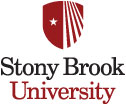Since November is Lung Cancer Awareness Month, the comprehensive Lung Cancer Program at Stony Brook University Cancer Center is increasing awareness about the leading cancer killer in both men and women in the United States.
At Stony Brook University Cancer Center, our team of experts specialize in lung cancer care and are well-equipped to provide comprehensive diagnosis and multidisciplinary treatment.
Allison McLarty, MD, Director of the Lung Cancer Program at the Stony Brook University Cancer Center and Associate Professor of Surgery at the Renaissance School of Medicine at Stony Brook University is available for an interview to discuss:
- changes to the eligibility for lung cancer screening
- lifesaving potential of lung cancer screening
- different types of lung cancer
- important advancements which hold promise for better treatment options
November is Lung Cancer Awareness Month - What You Need to Know About Screenings
Lung cancer is by far the leading cause of cancer death among both men and women, making up nearly 25% of all cancer deaths. Each year, more people die of lung cancer than of colon, breast, and prostate cancers combined, according to the American Cancer Society.
Since November is National Lung Cancer Month, it’s a good time to bring awareness to crucial changes to be screened for lung cancer.
Time is a critical factor when it comes to those with lung cancer. One of the reasons why lung cancer is the deadliest type of cancer for both men and women in the United States is the fact that symptoms don’t emerge until the disease has reached an advanced, non-curable stage.
In addition, new studies show an increase in lung cancer mortality and a decrease in diagnosis during the COVID-19 pandemic. Nationally, screening rates have increased every year since it was first recommended. However, the national rate did not change from 2019 to 2020, due to COVID-19 lockdowns.
Lung cancer screening gives us hope in the fight to defeat lung cancer and represents an opportunity to save lives. Screening with annual low-dose CT scans can reduce the lung cancer death rate by up to 20% by detecting tumors at early stages when the cancer is more likely to be curable.
In March of 2021, the United States Preventive Services Task Force expanded its recommendation for screening to include a larger age range and more current and former smokers. This dramatically increased the number of women and Black Americans who are considered at high risk for lung cancer.
Eligibility for Lung Cancer Screening
The Annals of Internal Medicine and the U.S. Preventive Services Task Force currently recommend lung cancer screening for patients who:
- Are current smokers or former smokers who have quit in the last 15 years;
- Are between the ages of 55 and 80 years old;
- Have no symptoms of lung cancer; and
- Have at least a 30-pack-year smoking history, such as two packs per day for 15 years, or one pack a day for 30 years.
The change is welcome news to Allison McLarty, MD, Director of the Lung Cancer Program at the Stony Brook University Cancer Center and Associate Professor of Surgery at the Renaissance School of Medicine at Stony Brook University, who believes it will allow the Lung Cancer Screening Program to find more malignant nodules.
Types of Cancer We Treat
The comprehensive Lung Cancer Program at Stony Brook University Cancer Center features a multidisciplinary team approach to diagnose and treat many types of lung cancer, including
- Non-small-cell and small-cell lung cancers
- Pulmonary neuroendrocrine tumors
- Pulmonary carcinoid tumors
In the case of known or suspected lung cancer, there are several ways to approach care, which may involve chemotherapy, surgery and/or radiation therapy. The specialists on the team collaborate with each other to determine an optimal individualized treatment plan, as well as with the patient and family members to address personal needs and quality-of-life issues.
For more information and appointments, visit cancer.stonybrookmedicine.edu/LungCancer or Call (631) SB-CANCER or (631) 722-2623.
